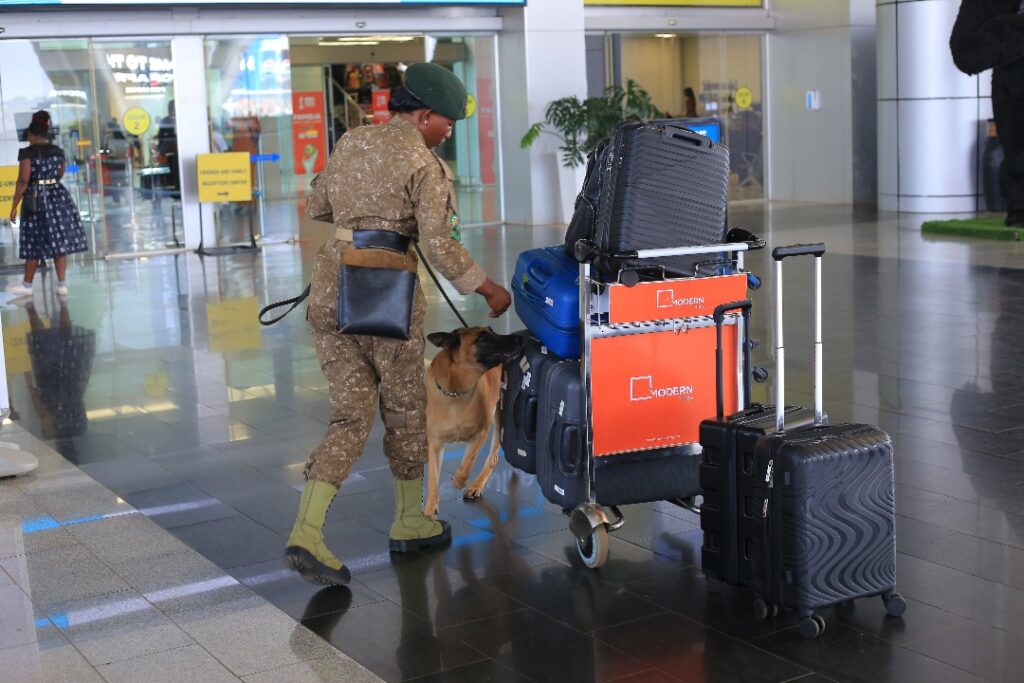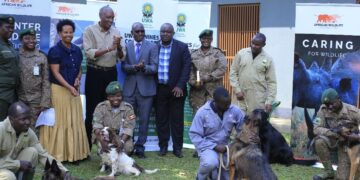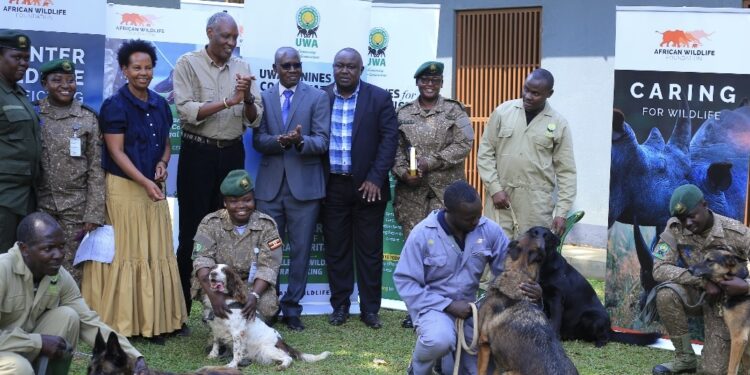The Uganda Wildlife Authority (UWA) has assumed full control of the canine detection units in Entebbe and Karuma, securing the future of one of Africa’s most effective anti-trafficking initiatives.
This milestone follows nine years of collaboration with the African Wildlife Foundation (AWF) under the Canines for Conservation Program and guarantees that Uganda’s fight against illegal wildlife trade will remain nationally led and sustainable for years to come.
The official handover was celebrated in Entebbe at the Uganda Wildlife Conservation Education Centre (UWEC), where UWA formally integrated the canine program into its operations.
Kaddu Sebunya, CEO of AWF, highlighted the program’s origins, “Nine years ago, we introduced canine detection to Uganda when trafficking networks were becoming increasingly sophisticated.”
“The results speak for themselves—trained handlers, proven facilities, and dogs that intercepted wildlife products before they could leave the country. Today’s handover confirms that Uganda has both the capacity and commitment to carry this work forward.”
He further noted that beyond law enforcement, the program has created jobs, with canine handlers now permanent staff of UWA.
It has also strengthened collaboration between agencies such as the Uganda Revenue Authority, Uganda Police, and the Office of the Director of Public Prosecutions, alongside international partners committed to dismantling wildlife crime networks.
Rose Ssebatindira, AWF’s Uganda Country Director, underscored the program’s significance, “These canine units have become part of Uganda’s identity in the fight against wildlife crime.”
“They have demonstrated that with the right tools and training, Ugandan rangers and law enforcement agencies can match and even outpace traffickers.”

The transition comes as UWA fully embeds the program into its organizational structure.
Dedicated positions for canine masters and unit leaders have been established, while budgetary resources are now allocated for replacement of dogs, training, and operations.
This will ensure the program’s continuity beyond donor support, firmly integrated into UWA’s long-term enforcement strategy.
Representing UWA Executive Director Dr James Musinguzi, the Director of Field Operations Charles Tumwesigye said, “We are proud to take full responsibility for the Entebbe and Karuma canine units. They are no longer pilot projects; they are now a permanent feature of our enforcement strategy.”
He added that the support received from AWF and its partners has been invaluable, and UWA will continue to build on this foundation to safeguard Uganda’s wildlife.
The canine detection program was first deployed at Entebbe International Airport in 2016 in response to increasingly sophisticated attempts to smuggle ivory, rhino horn, and pangolin scales. It later expanded to Karuma in the Murchison Falls Conservation Area, where tracker dogs were introduced.
What began as a pilot project has since become a cornerstone of Uganda’s anti-trafficking strategy.
To date, 28 rangers have been trained as handlers, 14 highly skilled dogs have been deployed, and specialized facilities including kennels, handler housing, and operations rooms have been established.
Between 2016 and 2018, the canine units recorded their highest number of seizures, with about 86 cases involving ivory, pangolin scales, and rhino horn hidden in cargo, luggage, and vehicles.
These successes disrupted trafficking networks and provided court-admissible evidence that led to prosecutions.
In recent years, the number of seizures has declined to between 30 and 40 annually a positive indication that trafficking syndicates are being suppressed through consistent enforcement.
The program’s impact extends beyond seizures. It has introduced higher standards in ranger training, including animal welfare, crime scene management, and courtroom testimony.
Handlers are now recognized as first responders in wildlife crime cases, ensuring evidence is preserved and prosecutions are strengthened.
A second event showcasing the canine units will be held in Karuma on September 5, 2025, featuring live demonstrations of tracker dogs in action.









